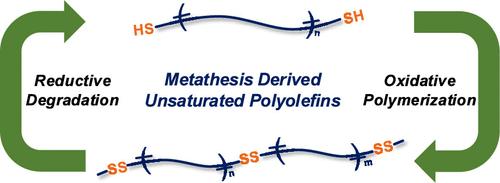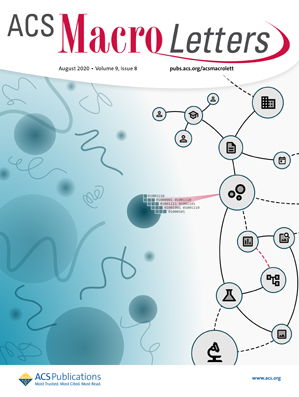Thiol- and Disulfide-Functionalized Polycyclooctene: Metathesis Polymerization, Degradation, and Reformation
IF 5.2
Q1 POLYMER SCIENCE
引用次数: 0
Abstract
The enormous global production and use of polymers and plastics, combined with slower and less efficient disposal and recycling methods, have led to a worldwide growth in plastic waste. Here, we describe an approach that builds degradability into macromolecular polyolefins through the design of telechelic oligomers with reactive functional groups that enables control over polymer deconstruction and reconstruction. Our work exploits disulfide-containing polymers that have emerged as promising cyclable materials due to their dynamic reversibility (bond formation and cleavage) driven by redox chemistry under mild conditions. Specifically, we describe the synthesis of a telechelic α,ω-dithiopolycyclooctene (PCOE) by ring-opening metathesis polymerization using a dithioacetate chain transfer agent, followed by deprotection to convert the chain-end thioacetates to thiols. This process was studied towards control over the degree of oxidation to yield disulfide-containing PCOE, followed by an evaluation of reductive degradation and oxidative repolymerization. Overall, this approach facilitates the production of disulfide-containing unsaturated polyolefins and the integration of degradable and reformable moieties into soluble, processable, metathesis-derived polymers.

巯基和二硫基功能化多环烯:复分解、聚合、降解和重整
聚合物和塑料在全球的大量生产和使用,加上处理和回收方法的速度较慢、效率较低,导致了全球塑料废物的增长。在这里,我们描述了一种方法,通过设计具有活性官能团的远旋低聚物,可以控制聚合物的解构和重建,从而构建大分子聚烯烃的可降解性。我们的工作利用了含二硫化物的聚合物,由于它们在温和条件下由氧化还原化学驱动的动态可逆性(键形成和裂解),它们已成为有前途的可循环材料。具体来说,我们描述了用二硫乙酸酯链转移剂通过开环复分解聚合合成远端α,ω-二硫代聚环烯(PCOE),然后通过脱保护将链端硫代乙酸酯转化为硫醇。研究了该工艺对氧化程度的控制,以产生含二硫化物的PCOE,随后对还原性降解和氧化再聚合进行了评估。总的来说,这种方法有助于生产含二硫化物的不饱和聚烯烃,并将可降解和可改造的部分整合成可溶的、可加工的、合成衍生的聚合物。
本文章由计算机程序翻译,如有差异,请以英文原文为准。
求助全文
约1分钟内获得全文
求助全文
来源期刊
CiteScore
10.40
自引率
3.40%
发文量
209
审稿时长
1 months
期刊介绍:
ACS Macro Letters publishes research in all areas of contemporary soft matter science in which macromolecules play a key role, including nanotechnology, self-assembly, supramolecular chemistry, biomaterials, energy generation and storage, and renewable/sustainable materials. Submissions to ACS Macro Letters should justify clearly the rapid disclosure of the key elements of the study. The scope of the journal includes high-impact research of broad interest in all areas of polymer science and engineering, including cross-disciplinary research that interfaces with polymer science.
With the launch of ACS Macro Letters, all Communications that were formerly published in Macromolecules and Biomacromolecules will be published as Letters in ACS Macro Letters.

 求助内容:
求助内容: 应助结果提醒方式:
应助结果提醒方式:


